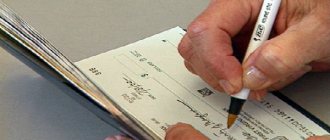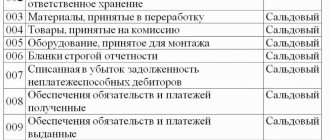Bank account blocking has recently become a widespread phenomenon. When blocking transactions and accounts of their clients, credit institutions refer to the Legalization Law No. 115 - Federal Law and the instructions of the Central Bank:
- Methodological recommendations approved. Bank of Russia 07/21/2017 N 18-MR
- Methodological recommendations approved. Bank of Russia dated July 21, 2017 No. 19-MR
- Bank of Russia Regulation No. 375 – P dated 03/02/2012
- Methodological recommendations of the Central Bank No. 5-MR dated 02/16/2018
- Regulation of the Central Bank of the Russian Federation No. 639-P dated March 30, 2018
In this article we will look at the reasons for blocking and refusal to carry out transactions on accounts, and also tell you how to act in a situation where the bank “does not allow you to work”.
Reasons for blocking an account by a bank
Blocking an account involves setting a ban on making expense transactions or seizing a certain amount. It can occur at the initiative of a bank, tax service, other government agencies or on the basis of a court decision. But in any case there must be appropriate grounds.
Here is a list of the most common reasons for blocking:
- Failure to pay taxes, fees, other contributions or failure to submit appropriate reports within the established time limits. Such blocking is established for the purpose of collecting from the taxpayer the amounts required by law.
- Judgment. Seizure of funds is possible during the forced execution of a judicial act on the basis of a bailiff's order, as well as when the court takes interim measures during the consideration of a claim.
- Suspicions regarding part 115-FZ. The state is very active in combating money laundering and other illegal activities aimed at financing terrorism. To solve this problem, banks are required to monitor customer transactions. If there is any doubt that the transaction is legal, payment is suspended. It becomes impossible or difficult to carry out operations before restrictions are lifted. The initiator of blocking under 115-FZ can be Rosfinmonitoring if the operations come into its field of view.
Account blocking by financial monitoring
Business representatives began to face the fact that banks often block the account of an LLC or individual entrepreneur. Federal Law 115-FZ imposes an obligation on credit organizations to monitor the legality of transactions. If suspicion arises, banks require the submission of supporting documents. If blocked at the initiative of Rosfinmonitoring, account operations may be suspended for up to 30 days.
Although the bank itself cannot establish a complete blocking of an account under Russian law, it has all the tools to restrict non-cash transactions for organizations or individual entrepreneurs. If repeated violations are detected, the credit institution may even refuse to provide service to the client.
The bank limits account transactions and requests documents in the following cases:
- The transaction is confusing or has unclear meaning. If it is difficult to understand the legitimate purposes of the operation and the benefits from it for an entrepreneur or organization, then the bank will require explanations.
- The nature of the transaction is clearly aimed at cashing out funds, evading taxes or control. A company that conducts transit operations or frequently withdraws funds received from an account will inevitably attract the attention of financial monitoring. The situation will be similar if there is an obvious splitting of the transfer amount in order to avoid control by Rosfinmonitoring.
- The transaction does not correspond to the goals of the organization's activities specified in the constituent documents. For example, if a payment is received into the account of a commercial organization with the intent “for charity,” then questions and control cannot be avoided.
- Other circumstances based on which it can be assumed that the transaction is aimed at money laundering or terrorist financing. In fact, any suspicion is enough for the bank. This can be caused by a low tax burden on the organization, sending a payment to a suspicious counterparty, etc.
Results
Any person can face blocking of a current account: both legal entities and individuals. The basis for this procedure is contained in the Tax Code of the Russian Federation (in this case it applies to tax payers - organizations, individual entrepreneurs, lawyers, notaries) and Law No. 115-FZ (here we are talking about persons in any status related to criminal activity). Both of these documents are based on their lists of reasons why an account may be blocked. The actual termination of operations on the account is carried out by the person performing operations with funds, and this occurs as soon as possible from the date of occurrence of the grounds requiring such action from him.
Sources:
- Tax Code of the Russian Federation
- Federal Law of August 7, 2001 No. 115-FZ
You can find more complete information on the topic in ConsultantPlus. Full and free access to the system for 2 days.
How to find out why your account is blocked
Before taking any action, you need to find out the reason for the blocking. Typically, notification of restrictions is sent to the client through a remote service system. This is exactly what Modulbank, Uralsib Bank and other credit organizations do. This document contains information about what measures must be taken to unblock the account.
If there is no access to Internet banking or it is also blocked, then you can try contacting your manager at the bank. Usually, specialists from Vozrozhdenie Bank, Promsvyazbank, etc. readily answer questions.
For details, your request will have to be submitted in writing. You will need to prepare a corresponding letter on company letterhead and bring it to the office of the credit institution.
What's going on in life?
In practice, it comes to the point that commercial banks block all transactions on a current account from the moment a request for documents and information is sent until the response is received and processed. Moreover, this often happens to completely conscientious clients who have nothing to do with terrorism or money laundering.
Sometimes the volume of documents requested by the bank is so large that it is physically impossible to provide the required amount of requested information within the specified time frame. Of course, I advise you not to violate the deadlines, but if you understand that the situation is hopeless and you don’t have time, don’t despair! Urgently write a letter to the bank and indicate the approximate volumes that you need to provide.
– If we are talking about a huge amount of information that needs to be copied on paper, describe the approximate number of pages or, perhaps, we are talking about volumes in bags and cars.
– If you are sending a response through a client bank, then write in the letter approximately how many containers of information you will have.
In any case, do not remain silent and start fulfilling the bank’s request immediately, this way you are more likely to respond in a timely manner.
According to Business Russia, almost half a million entrepreneurs had their bank accounts blocked. And not all of them were actually involved in money laundering and aiding terrorism. For those on the “black list”, even if they open a new current account, it is unlikely that they will be able to work normally. The situation for business is indeed very difficult. At the Eastern Economic Forum in September 2020, an entrepreneur complained about this to the head of Sberbank, German Gref, and heard in response that small businesses are “a profit laundering factory.”
This begs the question:
How to pay taxes if your account is blocked
The reasons for blocking an account can be very different. If the account is blocked by the tax service due to unpaid taxes, then it is enough to deposit the required amount.
An entrepreneur can send a tax payment from his personal account or pay it in cash at a bank. It is somewhat more difficult for organizations. For a long time, they could pay tax payments exclusively from their current account. But in 2020 the situation has changed. Currently, the director of an organization or its representative, acting on the basis of a power of attorney, can pay taxes in cash, for example, at Sberbank or send the corresponding payment from his personal account.
Reasons why a bank may recognize a company or individual entrepreneur as dishonest.
- The amount of taxes and other payments to the budget is less than 0.9% of the debit turnover, then the account will most likely be blocked.
- The account does not pay salaries to the client's employees.
- Personal income tax and contributions or the salary itself does not correspond to the average number of employees.
- The wage fund is set at a rate below the subsistence level.
- Personal income tax is transferred, but insurance premiums are not paid.
- There is no balance in the account or it is small compared to the volume of regular transactions.
- Payments do not relate to costs inherent in the activity.
- There is no connection between the reasons for crediting money to the account and their subsequent debiting.
- There was a sharp increase in account turnover.
- There are no payments common for business: for example, rent, utilities, purchases of office supplies, etc.
- Funds are credited to the account from counterparties under contracts with the allocation of VAT and are almost completely written off by the client in favor of counterparties for objects not subject to VAT. The bank will look at its other clients who are engaged in similar businesses. And compare what happens with VAT in similar situations.
- The bank monitors the client’s device identifier to ensure it matches the device identifiers of other bank clients, including those clients whose accounts were closed as part of anti-legalization measures. Matches are checked: – IP addresses, MAC addresses, phone numbers, etc.
- The ratio of the volume of cash received per week to bank account turnover is 30% or more.
- Less than two years have passed since the creation of the legal entity.
- The client's activities, within the framework of which money is received into the account and debited from it, do not create obligations to pay taxes. Or the tax burden is minimal.
- Money comes to the account from counterparties through whose bank accounts transit transactions take place.
- The receipt of funds from the counterparty to the client's account occurs with the simultaneous receipt of money from the same counterparty to the accounts of other clients.
- Money goes to the account in amounts, as a rule, not exceeding 600 thousand rubles.
- Withdrawal of cash regularly: usually daily or within a period not exceeding three to five days from the date of receipt.
- Cash is withdrawn in an amount not exceeding 600 thousand rubles, or in an amount equal to or slightly less than the daily limit established by the bank;
- Cash is withdrawn at the end of a business day, followed by withdrawal at the beginning of the next business day.
- The client has several corporate cards, and they are used primarily to carry out transactions to receive cash.
How to unblock a current account
When a blockage is detected on an account, the question immediately arises of what to do in such a situation. The first step is to receive a blocking notification and carefully study it. After this, you can begin to solve the problem. Depending on the situation, you should take the following actions:
- If your account is blocked by the tax service due to unfiled returns, you just need to submit them. If the reporting has already been sent previously, you will have to write a letter about unblocking the current account and attach to it documents confirming sending (postal receipts, confirmation of sending via TKS, etc.). Using a ready-made sample document, preparing your own application will not be difficult at all. SCREEN
- In a situation where an account is blocked by a court, the only solution will be to seek its cancellation. To do this, you need to file an appeal, cassation, etc.
- If the block is set by the bank, then you will have to prepare all the necessary documents that the bank asks for. If the decision on unlocking is negative, you need to provide additional clarification about your activities. But sometimes it is not possible to achieve results even after submitting all the documents. In this case, you can send a claim for illegal blocking to the bank and go to court to protect your interests. In case of official refusal of service, you can also contact the interdepartmental commission created under the Central Bank of the Russian Federation. The bank will also offer you a withdrawal of your money when closing the account at interest (usually from 10 to 25%).
How to remove a block imposed by decision of the Federal Tax Service
So, your bank account has been blocked - what should a person subject to such sanctions do? First of all, eliminate the reason for which the blocking was carried out. That is, it is necessary:
- pay the amount of tax, penalties or fines that caused the restriction of the ability to use the account;
- submit unsubmitted reports (declaration or calculation in form 6-NDFL);
- organize electronic exchange of documents with the tax authority;
- send an unsent document to the Federal Tax Service - confirmation of acceptance of the information or perform the actions proposed for execution in this information.
You can see a detailed algorithm of actions for each situation in the ConsultantPlus ready-made solution for unlocking an account by receiving a free trial access.
A decision taken by a tax authority to block an account is canceled by a document of similar status drawn up by the same authority. Moreover, for such registration, the Tax Code of the Russian Federation (clause 3.1, 8, article 76) establishes a specific period, counted as one working day from the date:
- receipt by the Federal Tax Service of originals or copies of payment documents indicating payment of the required amount of tax debt;
- filing the required report;
- ensuring the possibility of electronic interaction with the Federal Tax Service;
- sending a document to the tax authority - confirmation of receipt of information or completion of the actions proposed in this information (response to a request or appearance of a representative at the Federal Tax Service Inspectorate).
One more working day is given to the tax authority to send the decision to the bank (clause 4 of article 76 of the Tax Code of the Russian Federation). It is also sent there electronically. At the same time, this document is brought to the attention of the taxpayer (tax agent).
How to withdraw money from a blocked account
The bank will not allow you to simply remove the block and transfer money from the blocked account. If a credit institution has established restrictions on transactions, you can open an account in another bank and withdraw funds to it. But in this case, most banks will withhold a commission (10 - 15% of the amount).
Another option for withdrawing funds that allows you to bypass the blocking may be to obtain a court decision or order. Employees who are not paid a salary, a supplier, etc. can sue. If you have good relations with partners or use litigation with an affiliated company, you can withdraw money using this method with virtually no commission. But the big disadvantage will be the length of the process. It will take from 2 to 6 months to receive a court decision and writ of execution. A court order is issued much faster (up to 5 days), but it can result in recovery of no more than RUB 500,000. within the framework of one contract.
How can a business survive in the current conditions and not become a victim of banks?
For conscientious businessmen who have fallen under the yoke of the anti-money laundering law, we have prepared some tips. It's up to you to decide whether to use them or not. Of course, it all depends on the specific situation.
1 tip:
Do as Law No. 115 - Federal Law says. Namely:
provide all documents and explanations that the bank asks for . This will help remove suspicion from you and prove your trustworthiness. If you provide the necessary evidence and the bank considers it, then the payment transactions you are trying to make will not be classified as suspicious in accordance with clause 2 of Art. 7 of Law No. 115-FZ. If the bank has accepted the documents, but does not consider them, as practice shows, this is a fairly common occurrence, then advice 2 and 4 are at your disposal.
Tip 2:
Is the situation familiar? Have you already provided, more than once, explanations and documents for similar payments, which the bank considers dubious every time? The list of documents in the request is growing and growing, creating insurmountable obstacles? Is every business payment put under a magnifying glass? Have you been turned off by your bank client and forced to personally bring each payment, give explanations and provide documents supporting it? Are you seriously advised to leave on your own and this is done verbally? Don't rush to close your current account and switch to another bank ! You can try to open in another bank, but it’s not a fact that problems won’t catch you there too. Let me explain why.
If your company or individual entrepreneur already has entries in the 639-P list, all banks see them. By transferring funds when closing an account to a new current account, the bank can make a “parting gift”, namely, make another entry in list 639-P when sending the last payment. It will sound like “Transfer of own funds in connection with the closure of an account under 115-FZ.”
Therefore, before you leave and close your checking account, understand the situation at your current bank.
Find out the reasons for blocking operations, find out if there are decisions to refuse operations. Provide the bank with documents and information explaining the economic meaning of the transactions for which you were refused. According to amendments to Federal Law 115 dated March 30, 2020, the bank is obliged to accept and consider such information within 10 days. If at the end of this period the bank does not change its decision, then it is necessary to contact the interdepartmental commission. For more details on how to do this, read the article:
How to unblock an account under 115 Federal Law? How to get off the blacklist since March 2018?
If during the proceedings with the bank it turns out that there are no official decisions on refusals to carry out transactions in relation to your company or individual entrepreneur, this indicates that you do not comply with the bank’s internal control rules and the bank does not want to see you as its client. Try to find out the parameters by which you “sank” and correct the situation. This way you will show the bank your integrity and, perhaps, the sanctions will soon end. If the bank does not change its attitude, leave, but take into account the lesson you learned so as not to find yourself in a similar situation again. Get ready, maybe they will give you the “parting gift” that I wrote about above.
Tip 3:
What to do if you are blocked from all transactions on an account on which large sums of money are stuck? There are 3 ways to withdraw money from your current account completely legally.
Your creditor is suing you.
This will take time for the trial, but when the creditor wins the trial and receives a writ of execution, he can present it to the bank, and the bank will be obliged to execute it.
Use the Judicial Order mechanism.
A court order is a court decision made by a single judge on the basis of an application for the collection of sums of money if the amount of money to be collected or the value of movable property to be claimed does not exceed 500 thousand rubles.
The deadline for issuing a court order is 5 days from the date of receipt of the Application for debt collection.
If the bank, say, has imposed a ban on the payment of wages, ask the employees to contact the magistrate and get a court order.
The same advice is valid for debt collection by suppliers. But, no more than 500 thousand rubles under one contract.
The bank will not be able not to process the document, but the disadvantage is the limited amount of collection.
Pay your taxes.
It is better to pay a tax that is not present at all in your activities. Then, you can contact the tax office to get a refund of the amount paid by mistake. Since this tax is not inherent in your activity, there will be no proceedings regarding it. Within 1 (and in practice, sometimes 2.3) months, you should receive money to the bank account that you indicated in the Tax Refund Application.
Tip 4:
What to do if the bank accepted the documents upon request, but, not wanting to understand the situation, illegally blocks the entire current account, and not a separate transaction? In this case, a complaint against the actions of the bank must be submitted to the Central Bank of the Russian Federation and the servicing bank. If you have the resources of time, money and desire, contact the Arbitration Court. Demand that the bank's actions be declared illegal. According to Art. 65 of the Arbitration Procedure Code of the Russian Federation, the bank is obliged to prove that it had grounds for suspending or refusing to carry out operations on behalf of the client. If your transactions are completely legal and you have provided all supporting documents, then most likely the court will side with you and oblige the bank to unfreeze your current account. There are precedents like this and they are not uncommon.
Don’t forget that you can recover losses, interest for using someone else’s money and legal costs from the bank (Articles 15, 395 and 856 of the Civil Code of the Russian Federation). It is extremely necessary to use this right, because This encourages the credit institution in its subsequent activities not to rush to conclusions and to consider all the arguments before making decisions.
Tip 5:
Banks do not favor the situation when a client has more than 3 current accounts, each of which carries out different transactions. For example, taxes are paid on one account, and settlements with counterparties are carried out in another way. The Central Bank's instructions recommend that banks analyze account turnover, wage payments, taxes and much more. Without information on your other current accounts, the bank will simply inundate you with questions and requests for information. Of course, blocking of account transactions is a very real event that can be expected in this situation.
If possible, use one account to conduct all transactions in your business, or use several accounts, but distribute the cash flows correctly.
Remember that for each current account you must undergo the following operations:
- Wage
- Taxes and insurance premiums are at least 0.9% of the account revenue (many banks require 1-2%)
- General business payments
Judicial practice on account blocking
When 115-FZ began to be applied, the courts of first instance often sided with the bank, and the businessman was able to prove his case, at best, after an appeal. But now the situation has changed. This category of cases began to gain momentum, and the courts began to take a more responsible approach to decision-making.
If your operations are legal, then the court will definitely side with you. The main thing is to collect all the documents on the transactions that raised questions. The bank will also have to explain its position and confirm it, which is not always easy to do. In a situation where transactions are clearly questionable, the court will most likely refuse. But even in the latter case, the decision may be made in your favor, since it is the bank that has to prove that it had the necessary grounds to block the account.
Suspension of a specific financial transaction
If the bank has doubts about the purity of the transaction, then it has the right to demand additional documents and information. Clause 14 of Article 7 of Law No. 115-FZ establishes the obligation of clients to provide information necessary for banks to comply with legal requirements. Therefore, while receiving a response from the client and processing it, the bank suspends the transaction, which it considers doubtful, until the end of the next business day. At this time, you must have on hand all the documents necessary to confirm the operation:
- agreement
- check
- act/invoice or other supporting document.
The bank will either call or write a request through the client bank to provide documents confirming the operation. It is important to do this on time, otherwise the bank will not have time to verify the payment and process it before the end of the next business day. If the operation is still refused, then get ready for a more extensive check . In addition, the bank will add you to the “black list” No. 639-P. In the future, in order to prove the purity of the operation for which the refusal was received, you will have to go through a two-stage rehabilitation mechanism prescribed in Law No. 115-FZ.
I discussed in detail the mechanism for exiting the “Black Lists” in the article;
How to unblock an account under 115 Federal Law? How to get off the blacklist since March 2018?
What documents can banks request?
Any documents that banks will include in their internal control rules. Usually this is an open list, i.e. replenished. Banks are not required to disclose internal control rules, but it should be understood that the rules arise from the recommendations of the Central Bank of the Russian Federation. The main list of regulatory information that banks use in their activities is given above.
What are the deadlines for submitting the documents requested by the bank?
When carrying out a large-scale audit of a client, the Central Bank recommends setting a time frame of 3 to 7 days. Most often, banks adhere to this procedure. But, the operational deadline for checking a specific financial transaction, as I wrote above, is the end of the next business day. We have to make it in time!
What happens if you do not provide the information requested by the bank?
If the bank does not provide documents on time, the transaction on the account will not be carried out. If a similar situation repeats, and the client again tries to carry out a dubious transaction, the bank has the right to terminate the agreement (paragraph 2, clause 5.2, article 7 of Law No. 115-FZ). If we are talking not just about carrying out a specific financial transaction, but about a larger-scale audit, then, based on the results of such an audit, the client may be “asked” to leave the bank on his own initiative. To follow or not to follow the bank's lead? Here, each situation is deeply individual.
It is no secret that some banks, when closing an account, may charge a “fee for non-submission (incomplete submission) of documents during verification.” Such a commission can reach 10-20% on the client’s account balance. Sometimes, it is better to stay and not lose money, try to prove that you are right by sending complaints to the Central Bank of the Russian Federation and the bank itself. But, unfortunately, this mechanism does not work with many banks. Therefore, sometimes it is possible to return the illegally withheld “fee for non-submission (incomplete submission) of documents during inspection” only through the court. But, fortunately, the courts, in such cases, very often side with the client, of course, if the latter has all the necessary evidence of fulfillment of obligations at the request of the bank.
Conclusion - we give the bank the full amount of required information, on time, with a detailed inventory with explanations for each item of the request. We don’t miss anything, even what you never had and shouldn’t have had!
Which payments are not subject to blocking?
Even with a blocked account, a bank client has the right and even must pay various obligatory payments to budgetary and non-budgetary funds. And the bank has no right to refuse to carry out such operations. In Art. 855 of the Civil Code of the Russian Federation determines the order of payments when blocking an account:
- Compensation for harm caused to life and health, alimony.
- Payment of severance pay, wages under employment contracts.
- Payment of taxes and contributions on behalf of the Federal Tax Service, Pension Fund or Social Insurance Fund.
Executory documents for other monetary claims.
Persons entitled to request blocking of an account
You should definitely know what can block your account and to whom, in fact, to file a claim regarding this. Among such subjects it is customary to distinguish:
- The Tax Service is guided in its decision only by the norms and provisions of the Tax Code of the Russian Federation and applies its claims exclusively to taxpayers. The actions of the authority are concluded within the framework of its decision on the entry into force of the document and its cancellation.
- Persons carrying out actions with property to cover companies' debts to the budget (No. 115-FZ of 08/07/2001). If the conditions in accordance with the law “On Combating the Legalization (Laundering) of Proceeds from Crime and the Financing of Terrorism” are met, then the blocking works within the scope of its provisions. The inspection is carried out by a person who works with money or property. The supervisory authority or a special commission issues special rules for blocking. An authorized person has the right to block money and whoever is the owner of the means of payment, regardless of his legal status and residence.










